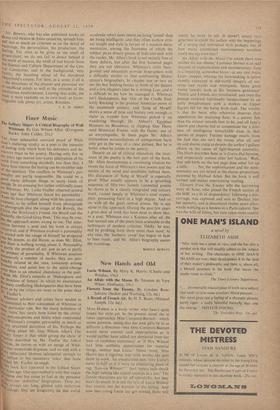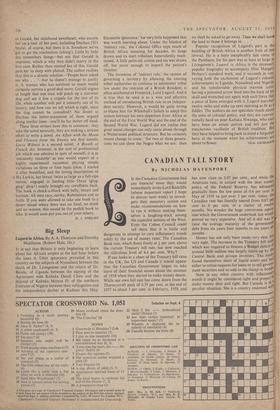New Hands and Old
Lucia Wilmot. By Mary K. Harris. (Chatlo and Windus, 15s.) A Breath of French Air. By H. E. Bates. (Michael Joseph, Its. 6d.)
Miss HARRIS is a lively writer who hasn't quite found her style yet. In the present novel she at times approaches Miss Compton-Burnett—which seems perverse, seeing that her own gifts lie in so different a direction—hut Miss Compton-Burnett would never commit such improprieties as 'it would neither have added nor detracted from her look of confident supremacy' or `if Mrs. Wilmot hai little aesthetic appreciation for material things, neither had Lucia.' Never mind, Miss Harris has a vigorous way with words.; she puts them to work. An exasperated nun 'tore Lucia's nam.: in half as if it were an infuriating piece of rag. "Loo-cia Wilmot !" ' And 'tennis balls shook the high netting like crazed animals in a zoo.'.The female characters are hit off splendidly, but they don't do much. It is not the tale of Lucia Wilmot that counts, but the manner of the 'telling. And now that young Lucia has got started, there will
surely he more to tell. It doesn't sound very generous to credit the author with the beginnings of a strong and individual style perhaps, but of how many established contemporary novelists could one say even that?
An Allair with the Moon ('in which there was neither sin nor shame,' Laurence Sterne) is an odd mixture of sophistication and sentimentality. Jane is a beguiling, somewhat loose--at any rate Anita Loos—poppet, whereas the love-making is rather sweetly conveyed in old-world imagery of tor- rents and rapids and whirlpools. Some good venial rascals, such as the 'business gentlemen' Thistle and Litmus, are introduced: and even the present reviewer (spiritually incapacitated by an early misadventure with a donkey in Upper Egypt) fell for the horsy Irish stuff. The trouble is that the hero, who otherwise deserves that appellation for marrying Jane. is a poorer fish than his creator intends him to be, and all Jane's charm and charms fail to compensate for a dim- ness of intelligence remarkable even in that species of poppet. Further damage results from the fact that she isn't the moon, after all, and sin and shame creep in despite the author's gallant efforts in the cause of light-hearted amorality. The blurb describes Jane as 'a Green Hat heroine, and desperately serious after her fashion.' Well, that still-birth on the last page does sober her up a little. . . . No, the sophistication and the senti- mentality are not mixed in the classic proportions patented by Michael Arlen. But the book is well written and makes entertaining reading.
Flowers from the Enemy tells the harrowing story of Anne, who joined the French section or the SOE 'in a tit of despondency' following a mis- carriage, was captured and sent to Dachau. lost her memory, and is discovered twelve years after- wards working as a hostess in a Paris cabaret. She was the wife of Julius, but now takes more readily to Gerald, her childhood sweetheart, who escorts her on a tour of her past, including Dachau (It's brutal, of course, but there it is. Somehow we've !got to get the mechanism ticking'). Little by little she remembers things—but not that Gerald is impotent, which is why they didn't marry in the first case. Rather than remind her of this, Gerald puts her to sleep with phenol. The author realises that this is a drastic solution—People have asked me why . . .'—but he-doesn't manage to justify it. A woman who has survived so much would certainly survive a good deal more. Gerald argues at length that one man will patch up a run-over dog and see it live a cripple for the rest of its life, while another will put it instantly out of its misery, and how can we tell which is right, since the dog cannot be consulted? No doubt at Dachau the better-mannered of them argued along similar lines—you'll be far better off dead. , These three writers have this in common : they take the novel seriously, they are making a serious effort to write a novel. An Affair with the Moon and Flowers from the Enemy are first novels; Lucia Wilmot is a second novel. A Breath of French Air, however, is the sort of professional job which one admires in spite of oneself; it is as 'eminently readable' as one would expect of a highly experienced raconteur playing simple variations on three or four basic jokes. I started it after breakfast, and the loving descriptions of ) Ma Larkin, her breast 'twice as large as a full-ripe melon,' engaged in feeding little Oscar (glug, glug! plop!) nearly brought my cornflakes back. The book is chock-a-block with belly, breast and buttock. All very racy, earthy, Rabelaisian and so forth. If you were allowed to take one book to a desert island where there was no food, no drink and no women, this would be the perfick book to take. It would soon put you out of your misery.
D. 3. ENRIGHT



































 Previous page
Previous page